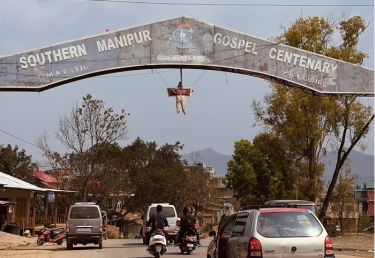
N Biren Singh’s embattled tenure as Manipur’s chief minister came to an end on Sunday, February 9, 2025, as he resigned amid escalating internal party discord and the looming threat of a no-confidence motion. The resignation, submitted to Governor Ajay Kumar Bhalla at the Raj Bhavan in Imphal at approximately 5:30 PM, came hours after crucial meetings with Union Home Minister Amit Shah in Delhi, marking a critical juncture in the state’s prolonged ethnic crisis that has claimed over 250 lives since May 2023.
The Governor has accepted his resignation whilst requesting him to continue as caretaker Chief Minister until alternative arrangements are made. His resignation comes amidst mounting pressure from within the Bharatiya Janata Party (BJP) state unit and ahead of a planned no-confidence motion that the opposition Congress had announced it would move in the assembly on Monday. The scheduled budget session has since been declared “null and void” by the Governor.
In his resignation letter, Singh expressed gratitude to the central government, stating, “It has been an honour to serve the people of Manipur thus far. I am extremely grateful to the central government for timely actions, interventions, developmental work and implementation of various projects for safeguarding the interests of every single Manipuri.”
Speaking to Christian Today veteran human rights activist and editor John Dayal said, "Singh's resignation comes after Manipur has burned for over 21 months, but his parting letter to the Governor is telling. It reveals his continued indifference towards the tribal communities, predominantly Christians. He does not even acknowledge the violence, or his failure to bring it to a halt, and has no sense of grief. He shows no signs of having a conscience.”
The development carries particular significance as it comes five days after the Supreme Court directed a central forensics laboratory to examine leaked audio tapes that allegedly feature Singh saying the ethnic violence was instigated at his insistence. The court has scheduled the next hearing for March 25.
Despite BJP state president A Sharda Devi’s assertions that there were “no differences among the BJP legislators,” party insiders reveal that Singh’s position had become increasingly untenable. Sources indicate that several BJP MLAs had threatened to support the opposition’s no-confidence motion if Singh remained at the helm.
The political arithmetic in the 59-member assembly (one seat is vacant following an NPP MLA’s death) had grown precarious for Singh. The BJP holds 32 seats, with support from various regional parties including the NPP (6 seats), NPF (5 seats), KPA (2 seats), JD(U) (6 seats), while the Congress has 5 seats and there are 3 independents. Notably, all seven BJP Kuki MLAs, two KPA members, and one independent had withdrawn support for Singh’s leadership.
The resignation has drawn mixed reactions from Manipur’s ethnic communities. Meitei groups consider the timing unfortunate, with Jeetendra Ningomba, former coordinator of Cocomi, expressing concern that “the move will strengthen Kuki separatist forces.” Meanwhile, Kuki groups, while welcoming the development, maintain that their demand for separate administration remains unchanged. ITLF spokesperson Ginza Vualzong stated, “We believe he knew he would be voted out in the no-confidence voting in the Manipur assembly, and to save his face, he must have submitted his resignation.”
The Congress has criticised the BJP for what it terms a “belated” decision. AICC general secretary Jairam Ramesh pointed out that this was a demand his party had been making since early May 2023, adding that “people of Manipur now await a visit by our frequent-flier Prime Minister who is off to France and the U.S. now - and who has found neither the time nor the inclination to go to Manipur these past 20 months.” Congress leader Rahul Gandhi accused Singh of having “instigated division in Manipur” over two years.
The central government now faces the challenging task of selecting Singh’s successor while addressing the deep-rooted ethnic divisions in the state. The conflict has effectively separated the Meitei-majority Imphal valley from the Kuki-dominated hills, with both communities largely confined to their respective territories.
Singh’s exit comes after 21 months of ethnic-religious strife that has not only claimed hundreds of lives but also displaced over 60,000 people. The crisis has significantly impacted the state’s development and administrative functioning, with former MP and NPF leader Lorho S Pfoze noting that Manipur needs “a more effective administration and a renewed focus on development.”
Singh’s resignation draws the curtain on a political career that saw him rise from a Border Security Force footballer to Manipur’s top office. After 13 years with the Congress, he joined the BJP in 2016 and became chief minister following the party’s victory in the 2017 assembly polls. He now exits office leaving behind a state deeply scarred by ethnic violence and facing one of its gravest crises since statehood.




